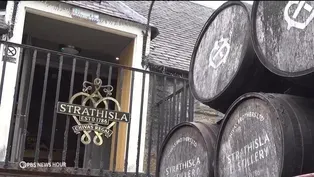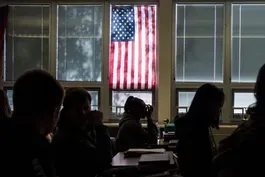
New Mexico's 'Earthships' offer unique living off the grid
Clip: 6/20/2024 | 7m 6sVideo has Closed Captions
New Mexico's 'Earthships' offer unique model for living off the grid
This summer’s extreme heat and the demand for air conditioning are putting a big strain on the electricity grid in many parts of the nation. But for more than 40 years, a pioneering architect in New Mexico has been building a unique kind of home that can be heated and cooled without using any electricity at all. Special Correspondent Megan Thompson reports.
Problems with Closed Captions? Closed Captioning Feedback
Problems with Closed Captions? Closed Captioning Feedback
Major corporate funding for the PBS News Hour is provided by BDO, BNSF, Consumer Cellular, American Cruise Lines, and Raymond James. Funding for the PBS NewsHour Weekend is provided by...

New Mexico's 'Earthships' offer unique living off the grid
Clip: 6/20/2024 | 7m 6sVideo has Closed Captions
This summer’s extreme heat and the demand for air conditioning are putting a big strain on the electricity grid in many parts of the nation. But for more than 40 years, a pioneering architect in New Mexico has been building a unique kind of home that can be heated and cooled without using any electricity at all. Special Correspondent Megan Thompson reports.
Problems with Closed Captions? Closed Captioning Feedback
How to Watch PBS News Hour
PBS News Hour is available to stream on pbs.org and the free PBS App, available on iPhone, Apple TV, Android TV, Android smartphones, Amazon Fire TV, Amazon Fire Tablet, Roku, Samsung Smart TV, and Vizio.
Providing Support for PBS.org
Learn Moreabout PBS online sponsorshipGEOFF BENNETT: This summer's extreme heat# and the demand for air conditioning are## putting a big strain on the electricity# grid in many parts of the country.
But for more than 40 years, a pioneering# architect in New Mexico has been building## a unique kind of home that can be heated and# cooled without using any electricity at all.
Special correspondent Megan Thompson reports.
MEGAN THOMPSON: Five years ago, empty-nesters## Jess and Brian Johnson decided to leave Colorado# and move south to just outside Taos, New Mexico,## a place they'd loved visiting, and# where their dollar could go further.
JESS JOHNSON, New Mexico Resident: This is a# two-bedroom, two-bathroom, 2,000-square-foot home.
MEGAN THOMPSON: They have an# open living area, a fireplace,## and a sauna with views of the Southern# Rockies.
But the more unique features## are harder to see.
The home is off the grid,# meaning it's not connected to power, water,## or sewer lines.
Their water comes from# snow and rain, electricity from the sun.
BRIAN JOHNSON, New Mexico Resident: We're# not crazy conservationists.
We take showers## every day and run the dishwasher and# the washing machine and everything.## The only way we're radical, really,# is that we don't pay utility bills.
MEGAN THOMPSON: The Johnsons' home is called an## Earthship.
There are around# 200 in Northern New Mexico.
MICHAEL REYNOLDS, Earthship Architect: These# are the same drawings I made for the front face.
MEGAN THOMPSON: Michael Reynolds came# up with the idea as a young architect.
MICHAEL REYNOLDS, Ever since college,## I have looked at the world around# me and been disturbed by it.
MEGAN THOMPSON: In the early '70s,# Reynolds was especially disturbed## by the growing garbage problem in the# U.S., before recycling was widespread.
MICHAEL REYNOLDS: So I started# addressing it just for myself.## Then people started relating to it# and wanting me to do it for them.
MEGAN THOMPSON: Reynolds began experimenting# with building off-grid homes partly from## aluminum cans.
He came up with a# model that began to get attention.
MICHAEL REYNOLDS: I have six things that I have# determined are necessary for human sustenance.
It## is comfortable shelter without use of fossil# fuel, electricity, water, food, treatment of## human waste, and treatment of garbage.
Anywhere# anybody lives, those six things must be addressed.
MEGAN THOMPSON: Reynolds started a company to# build and sell his homes and to teach people## how to build their own.
Today, more than 200# students and interns come here each year to learn## Earthship building techniques, which have been# incorporated in some 3,000 homes around the world.
DEBORAH BINDER, Earthship Project Manager: When# I came across this, it just made sense to me.
MEGAN THOMPSON: Deborah Binder manages# construction for Mike Reynolds.
She's## also in the middle of building her own Earthship.
DEBORAH BINDER: So this is going to# be filled with pants once it's done.
MEGAN THOMPSON: Recycled materials# are still a key building component.
DEBORAH BINDER: At least, here in Taos,# glass bottles aren't recycled anymore.
And## you use less cement by using them, and you# end up with these really beautiful walls.
MEGAN THOMPSON: Earthships' side and back# walls are made from about 1,000 old tires;## 300 to 400 pounds of dirt are rammed by# hand into each one.
The tire walls are## built into a mound of earth to create an# extremely dense and insulating structure.
DEBORAH BINDER: It's almost like if you're# inside a cave.
So caves usually stay at about 63,## 65 degrees all year round.
And so then it's a# lot easier to cool or to warm up that space.
MEGAN THOMPSON: In the winter, Brian# and Jess Johnson's home is warmed## up by sunlight streaming in through the# southern wall of windows.
In the summer,## a system of tubes and vents brings# cooler air in from the back of the house.
BRIAN JOHNSON: You open that vent,## the hot air rises and pulls cool air th.. JESS JOHNSON: Well maintain# 70 to 73 degrees Fahrenheit## whether it's 110 degrees outside# or negative-10 degrees outside.
MEGAN THOMPSON: The Johnsons'# electricity comes from 14 solar## panels.
Brian says they have learned# how to avoid draining the batteries.
BRIAN JOHNSON: We don't run our dishwasher# and our washer and dryer at night.
So, there## are little trade-offs like that, but it's never# going without.
It's just going at the right time.
JESS JOHNSON: Right.
MEGAN TH.. where the Johnsons grow bananas, grapes and figs.
Back outside, the slanted metal roof# also doubles as a water catchment system.
BRIAN JOHNSON: All the rain or# snow that falls on our roof gets## collected in cisterns behind our home.# We have about 8,000 gallons of storage.
MEGAN THOMPSON: The water is filtered# and first flows to the sinks, showers,## and laundry.
Then it drains to the greenhouse# to water the plants.
From there, it flows to## the toilets.
Then, finally, it's flushed outside# to a septic system that waters another garden.
JESS JOHNSON: So one, two, three, four# uses for every drop of water in this house.
MEGAN THOMPSON: The Earthships'# ingenuity, unusual designs,## and downright quirkiness have# made them a tourist attraction.
MAN: This is just one of five# properties that Mike's developed.
MEGAN THOMPSON: You can rent one on Airbnb,# or buy a new 1,600-square-foot two-bedroom## for half-a-million dollars.
This# larger model is $1.7 million.
But building Earthships on a wide scale outside# of a community like this is challenging.
For one,## they're so unconventional that obtaining# building permits and financing can be difficult.
KIM SHANAHAN, Green Homebuilding Expert: Unless# you have got the time and the inclination on your## own to do it or can afford a tremendous amount# of labor costs, it just doesn't make any sense.
MEGAN THOMPSON: Sustainable homebuilder# Kim Shanahan is the former head of the## Santa Fe Area Home Builders Association# and was active with the nonprofit Green## Builder Coalition.
He says those# tire walls are the biggest problem.
KIM SHANAHAN: Each little step# of the wall is a lot of labor,## and it's simply not something that# a production builder or even a small## builder could ever imagine doing.
And that's# why it never really could be done at scale.
MEGAN THOMPSON: But Shanahan# says Mike Reynolds' other## ideas helped inspire an entire# generation of green homebuilders.
KIM SHANAHAN: Self-sustaining power and# warmth and electricity through solar panels,## roof water capture and reuse, this is the# future, not necessarily tires in walls, but all## the other principles that that Mike Reynolds has# taught us about what a house can and should be.
BRIAN JOHNSON: I think we need to# start rethinking our buildings.
MEGAN THOMPSON: Brian and Jess# Johnson figure they're saving## around $500 a month on utilities compared to what## they were paying back in Colorado.
But# they say it's not all about the money.
BRIAN JOHNSON: Once you start looking at# these homes differently than traditional## construction in the country and in the# world, these just make so much more sense.
JESS JOHNSON: It feels good to be part of# that.
You know you're just a little bite,## but you're part of some --# something special, I think.
MEGAN THOMPSON: For the "PBS NewsHour," I'm# Megan Thompson outside Taos, New Mexico.
How Scotch whisky producers are aiming to go carbon neutral
Video has Closed Captions
How Scotch whisky producers are aiming to go carbon neutral (6m 32s)
Louisiana law raises separation of church and state concerns
Video has Closed Captions
Louisiana's Ten Commandments law raises new concerns over separation of church and state (6m 28s)
Netanyahu faces doubts from IDF leaders over war in Gaza
Video has Closed Captions
Netanyahu faces doubts from Israeli military leaders over war in Gaza (7m 29s)
News Wrap: Putin sign deals with Vietnam to bolster support
Video has Closed Captions
News Wrap: Putin sign deals with Vietnam during trip to bolster Russian support in Asia (8m 13s)
Our critics pick their favorite new books for the summer
Video has Closed Captions
Our critics pick their favorite new books for your summer reading list (8m 5s)
Right-wing disinformation fuels election conspiracy theories
Video has Closed Captions
How right-wing disinformation is fueling conspiracy theories about the 2024 election (7m 31s)
Providing Support for PBS.org
Learn Moreabout PBS online sponsorshipSupport for PBS provided by:
Major corporate funding for the PBS News Hour is provided by BDO, BNSF, Consumer Cellular, American Cruise Lines, and Raymond James. Funding for the PBS NewsHour Weekend is provided by...

















